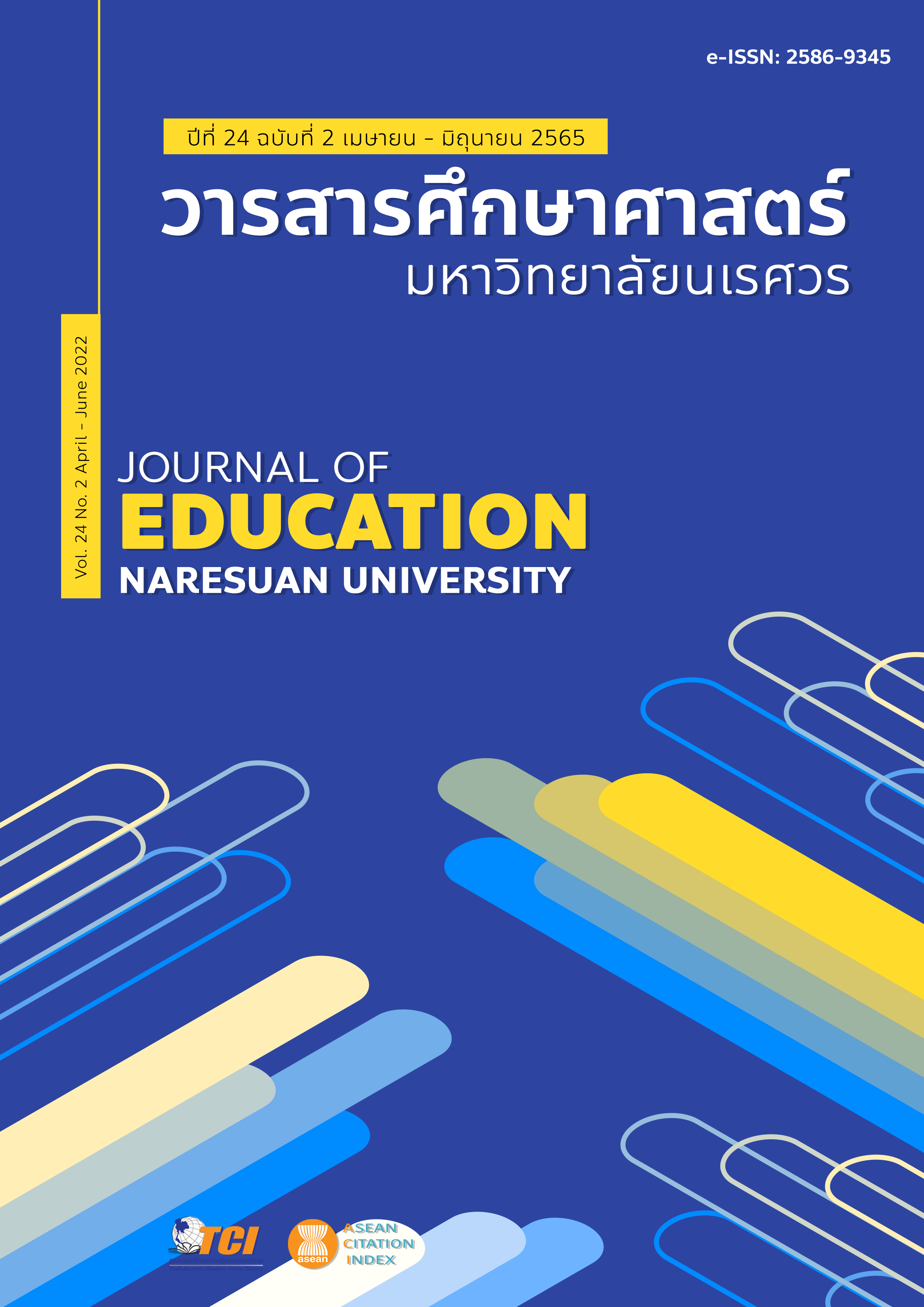ENHANCEMENT OF PARTICIPATION AMONG FAMILIES, ORGANIZATIONS AND COMMUNITIES USING A NON-FORMAL EDUCATION PROGRAM IN PREPARING PEOPLE WITH AUTISM FOR FUTURE CAREERS การส่งเสริมการมีส่วนร่วมระหว่างครอบครัว องค์กร และชุมชน ด้วยโปรแกรมการศึกษานอกระบบ โรงเรียนในการเตรียมบุคคลออทิสติกเข้าสู่อาชีพ
Main Article Content
Abstract
The objectives of this research were 1) to develop a non-formal education program to enhance the participation among families, organizations and communities preparing people with autism for future careers and 2) to propose the guidelines to enhance the participation among families, organizations and communities using a non-formal education program in preparing people with autism for future careers. The sample of this study consisted of 30 representatives from families, organizations and communities and 16 experts participating in
the focus group discussion. The research instruments included a questionnaire, an interview and a data form. Data collected were analyzed using content analysis. The results of this research indicated as follows:
1. The developed non-formal education program to enhance the participation among families, organizations and communities in preparing people with autism for future careers consisted of 8 steps, namely: 1) role review and learning, 2) primary learning and evaluation, 3) enterprise learning and evaluation,
4) appropriate career determination, 5) cooperation with outside agencies, 6) evaluation, 7) reflection and lessons learned, and 8) learning transfer.
2. The guidelines for enhancing the participation among families, organizations and communities using the non-formal education program in preparing people with autism for future careers consisted of 4 dimensions, called physical dimension, mental dimension, technical dimension and network dimension.
Article Details

This work is licensed under a Creative Commons Attribution-NonCommercial-NoDerivatives 4.0 International License.
The owner of the article does not copy or violate any of its copyright. If any copyright infringement occurs or prosecution, in any case, the Editorial Board is not involved in all the rights to the owner of the article to be performed.
References
Boone, E. J. (2002). Developing programs in adult education. Illinois: Waveland Press.
Bryan, J., & Henry, L. (2012). A model for building school–family–community partnerships: Principles and process. Journal of Counseling & development, 90(4), 408-420.
Buttichak, A. (2009). Effects of fit ball exercise on flexibility, balance and muscular strength of the autistic children. An Online Journal of Education (OJED), 1, 100-114. [in Thai]
Caffarella, R. S. (2002). Planning programs for adult learners (2nd ed.). San Francisco: Jossey-Bass Publishers.
Chokdamrongsuk, J. (2014). Autism and work together we can change autism from “burden” to “power”. Paper presented at the World Autism Awareness Day 2014. Bangkok: Kasetsart University Bang Khen. [in Thai]
Cohen, J. M., & Uphoff, N. T. (1977). Rural development participation: Concept and measures for project design implementation evaluation. Paper presented at the Rural Development Committee Center for International Studies, Cornell University.
del Brío, J. Á., Fernandez, E., & Junquera, B. (2007). Management and employee involvement in achieving an environmental action-based competitive advantage: An empirical study. The International Journal of Human Resource Management, 18(4), 491-522.
Department for Empowerment of Persons with Disabilities. (2009). Operational law handbook for life quality enhancement and development of persons with disabilities. Bangkok: Department for Empowerment of Persons with Disabilities. [in Thai]
Department of Mental Health. (2014). Building Thai society with employment tryout project. Department of Mental Health’s News, 21(245), 4-5. [in Thai]
Department of Mental Health. (2018). Department of Mental Health successfully developed the country's first "autism" diagnosis machine for Thai children!!. Retrieved November 24, 2019, from http://www.prdmh.com//ข่าวสาร/ข่าวแจกกรมสุขภาพจิต/1217-กรมสุขภาพจิต-ประสบผลสำเร็จพัฒนาเครื่องตรวจวินิจฉัยภาวะ“ออทิสติก”เด็กไทย-ชุดแรกของประเทศ.html. [in Thai]
Epstein, J. L. (2010). School/family/community partnerships: Caring for the children we share. Phi Delta Kappan, 92(3), 81-96.
Karst, J. S., & Hecke, A. V. V. (2012). Parent and family impact of autism spectrum disorders: A review and proposed model for intervention evaluation. Clinical Child and Family Psychology Review, 15(3), 247-277.
Khueansuwan, I. (2009). Designing the Developmental Enhancement Program Based on DIR for an Autistic Child (Master thesis). Chiang Mai: Chiang Mai University. [in Thai]
Limsila, P. (2007). Special child 2nd lesson. Bangkok: Bangkok Press. [in Thai]
Marin-Garcia, J. A., & Bonavia, T. (2015). Relationship between employee involvement and lean manufacturing and its effect on performance in a rigid continuous process industry. International Journal of Production Research, 53(11), 3260-3275.
Martín, I. B., & Llusar, J. C. B. (2018). Examining the intermediate role of employee abilities, motivation and opportunities to participate in the relationship between HR bundles and employee performance. Business Research Quarterly, 21(2), 99-110.
Meyer L. S., Taylor B. A., Cerino K. E., Fisher J. R., Moran L., & Richard E. (2006). Alpine Learning Group. Austin, TX: Pro-ed.
Moxom, L., & Gates, D. (2001). Children with autism: Supporting the transition to adulthood. Education and Child Psychology, 18, 28-40.
Nakorntab, A. (2008). Education in community: The experience synthesis in the educational research with community project. Bangkok: The Thailand Research Fund. [in Thai]
Rajanukul Institute. (2008). Handbook for caring and providing basic work skills for persons with autism and intellectual disabilities. Bangkok: Social work section of Prosperous Plus. [in Thai]
Riewpaiboon, W., Sirivej, P., Wipulakorn, P., Muksong, C., & Eiamnoi, P. (2010). Creating family and community participation. In Dumrikarnlert, L. (Ed.), Work experience in health promotion for persons with disabilities. Bangkok: Sahamitr Printing and Publishing. [in Thai]
Scott, M., Falkmer, M., Falkmer, T., & Girdler, S. (2018). Evaluating the effectiveness of an autism-specific workplace tool for employers: A randomised controlled trial. Journal of autism and developmental disorders, 48(10), 3377-3392.
Section of Education for Handicapped Group. (2007). Operational guidelines for Special Education Center. Bangkok: Office of the Basic Education Commission. [in Thai]
Stefanski, A., Valli, L., & Jacobson, R. (2016). Beyond involvement and engagement: The role of the family in school-community partnerships. School Community Journal, 26(2), 135-160.
Utairatanakit, D. (2009). Education management for children with autism. Bangkok: Kasetsart University Laboratory School, Center for Educational Research and Development for Students with Special Needs. [in Thai]
Zablotsky, B., Boswell, K., & Smith, C. (2012). An evaluation of school involvement and satisfaction of parents of children with autism spectrum disorders. American Journal on Intellectual and Developmental Disabilities, 117(4), 316-330.


